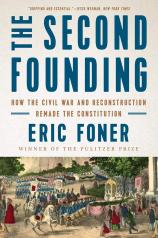The Second Founding: How the Civil War and Reconstruction Remade the Constitution
Review
The Second Founding: How the Civil War and Reconstruction Remade the Constitution
Pulitzer Prize-winning Civil War historian Eric Foner (THE FIERY TRIAL) sets his sights on the era of Reconstruction and the changes it wrought in America’s premier document.
As Foner points out, there were many issues not addressed by the original Constitution, and slavery was certainly among them. Yet it also is true that the founders never envisioned all-out war between two major blocs of America’s states. The results were not confined merely to winners and losers and the usual aftermath of conflict, but quickly spread to the greater concepts of rights and equality --- rights of states and individuals, the right to vote, to own property, to protection under the law; and, as for equality, who would have it, and what its reach would be.
"It is to be hoped that Foner’s conscientious presentation of the facts will lead to greater understanding of our history and new, creative approaches."
To deal with these thorny issues, three constitutional amendments were created --- the Thirteenth (freeing slaves and forbidding involuntary servitude except for criminals), Fourteenth (endowing citizenship on all persons born or naturalized in the United States) and Fifteenth (giving the right to vote to all citizens regardless of “race, color, or previous condition of servitude”).
Foner examines in minute detail the differences between rights and equality as perceived in the Reconstruction era and beyond. Southerners, already aggrieved by the conditions of their defeat, believed that their states’ rights would be abridged were they forced to grant absolute equality to freed slaves. A primary example was the wish of any state to limit voting rights, which generally meant depriving blacks of those rights. The specter of white supremacy, underpinned by Jim Crow laws, continued to stalk the South, while Northern states, though more tolerant, also practiced tacit racial discrimination. And, of course, women were not as yet included in the “equal” right to vote. Many reasonable people believed in the ideal of equality, but not in the individual rights that would be accorded to everyone if all were considered equal.
Issues of immigration also began to arise, some apart from racial considerations: the Irish, for example, were considered inferior. As Foner points out, too, Chinese railroad workers in the West were objects of despite and derision; the Fourteenth Amendment was not enforced for anyone but white immigrants “well into the twentieth century.” Furthermore, the Thirteenth Amendment opened the door for the wholesale use of convict labor, morphing in current times into “contract, for-profit prisons where inmates are required to labor.”
Foner clearly illustrates in case after case how the tangled skeins of misinterpretation, obfuscation and outright disobedience of the three Reconstruction amendments still plague us. The old adage reminds us that those who do not understand history are doomed to repeat it. It is to be hoped that Foner’s conscientious presentation of the facts will lead to greater understanding of our history and new, creative approaches.
Reviewed by Barbara Bamberger Scott on September 20, 2019
The Second Founding: How the Civil War and Reconstruction Remade the Constitution
- Publication Date: August 11, 2020
- Genres: History, Nonfiction
- Paperback: 304 pages
- Publisher: W. W. Norton & Company
- ISBN-10: 0393358526
- ISBN-13: 9780393358520




